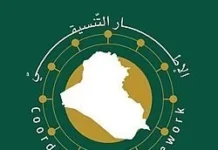Tishwash: Is Washington’s refusal to grant a Sudanese visa a political message or a diplomatic slap in the face?
An informed political source confirmed to Al-Mustaqilla on Wednesday that Iraqi Prime Minister Mohammed Shia al-Sudani has not yet obtained an entry visa to the United States, despite the start of the UN General Assembly meetings in New York.
The source, who spoke on condition of anonymity due to the sensitivity and accuracy of the information, stressed that the Prime Minister’s Office had not received any official notification from the US embassy in Baghdad or the Iraqi embassy in Washington regarding the issuance of visas to the Iraqi delegation.
This has raised widespread questions about the reasons for this unusual delay, especially since participation in UN meetings is an international protocol open to world leaders.
The source added that the lack of clarity from Washington has prompted many observers, followers, and media outlets to raise several possibilities, most notably that the delay reflects an undeclared political stance by the US president’s administration toward the current Iraqi government, or a pressure message linked to thorny and complex domestic and regional issues, amid escalating disagreements over the US military presence and relations with Iran.
Others believe the matter may be merely technical or procedural, but its timing raises questions about Washington’s willingness to treat al-Sudani’s government as a genuine partner, or to limit it to the status of an “international observer.”
The question remains: Will Washington grant al-Sudani a visa at the last minute, or is Iraq facing a new diplomatic crisis at the United Nations? link
Tishwash: International praise for Iraq’s balanced policies
Several NATO members, including the United States, France, Italy, and the United Kingdom, have commended the Iraqi government’s policies and its efforts to address security challenges.
The delegates’ praise came during a session of the North Atlantic Council, which hosted Prime Minister Mohammed Shia al-Sudani yesterday, Monday, in the Belgian capital, Brussels.
Al-Sudani delivered a speech in which he noted that this meeting is being held amidst the turmoil and fundamental transformations taking place in the Middle East, the violation of the principles of the international order, the perpetration of crimes against humanity, and the threat to regional security. He emphasized the establishment of a constructive partnership with NATO based on a sovereign decision, aiming for comprehensive, long-term relations in various fields.
The Prime Minister explained that Iraq is no longer a security concern, but rather a reliable strategic partner.
Representatives from ten NATO member states, including the United States, France, Turkey, the Netherlands, Italy, the United Kingdom, Slovakia, Greece, Hungary, and Latvia, delivered interventions and expressed their positions.
Some delegates also represented the positions of several other NATO member states. International praise was paid to the Iraqi government’s policies and its efforts to address security challenges, particularly those positions that have helped Iraq avoid the repercussions of the escalation currently taking place in the region.
These interventions included an emphasis on the long-term partnership between the member states of the Atlantic Council and Iraq, as well as an emphasis on the fact that Iraq represents a fundamental pillar in enhancing regional security and stability, in addition to praising Iraq’s role, its balanced foreign policy, and its wise management of situations in events.
Regional. The interventions also commended the Iraqi government’s success in building the defensive capabilities of its armed forces, noting that a stable Iraq is a guarantee of regional security. They also emphasized the Atlantic Council countries’ commitment to supporting Iraq’s security, and emphasized that Iraq today is a force for regional peace. link
************
Tishwash: The Central Bank’s fruitful efforts to achieve the comprehensive banking reform project.
Samir Al-Nusairi
The Central Bank’s actions and efforts, in partnership and consultation with private banks, have been fruitful in facilitating the implementation of the objectives, mechanisms, and standards of the comprehensive banking reform project, in cooperation with the government and the global consulting firm Oliver Wyman, and the objectives and initiatives of its third strategy.
Given that economic reform begins with banking reform, the challenges facing the Iraqi economy and the opportunities for reform in the banking and financial sector are highlighted in the government’s program, as are the prospects for the Central Bank’s future vision for the role of the banking sector in achieving sustainable development and investment.
The efforts currently being made to activate and revolutionize productive economic sectors other than oil to diversify sources of national income, achieve financial sustainability, and accelerate the growth of the national economy are also highlighted, as is the role of the Central Bank in regulating foreign trade financing, completing infrastructure projects to achieve comprehensive digital transformation, and expanding the use of electronic payment tools to achieve financial inclusion.
Opportunities exist to reform and develop the banking sector during 2025-2028 in accordance with the following objectives:
First: Developing the Iraqi banking system and its compliance with international banking and accounting standards.
Second: Building a sound, modern, comprehensive and flexible banking sector.
Third: Enhancing citizens’ confidence in the banking sector locally and internationally, and acknowledging its transparency, progress, and strict commitment to international standards, and gaining the trust of reputable correspondent banks to deal with it.
Fourth: Rehabilitating restricted and weak banks to return to activity in the banking market with full internal and external activities.
Fifth: Transforming banks to their primary function, which is financing and bank lending for development, and enhancing financial inclusion and increasing its current rate as planned.
Sixth: Strengthening the procedures and decisions for the transition from a cash economy to a digital economy, withdrawing funds outside the banking cycle, which constitute approximately 80%, and introducing them into the banking system.
Although all the above objectives have a three-year implementation period according to the banking reform project and the Central Bank’s strategy, what was achieved in 2023 and 2024 and up to June 30, 2025 in terms of building foundations, rules and pillars formed a supportive pillar in building the mechanisms and paths of the desired reforms, and they constitute ambitious percentages as announced, which will lead to the evaluation and classification of banks based on their achievement of the planned objectives in the reform project according to the internationally approved standards and criteria link






